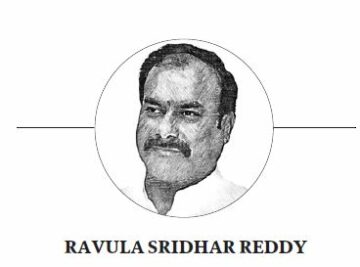Opinion: Protect investors, uphold integrity of markets
When we assess Sebi’s leadership, we must question why government appoints individuals whose impartiality is in doubt

By Ravula Sridhar Reddy
The news surrounding the Adani Group and the allegations put forth by Hindenburg Research has raised significant concerns not only about corporate governance but also about the integrity of our financial regulatory system. As I see these unfolding events, a sense of unease fills me as I consider the implications for investors whose hard-earned money is at stake.
Eighteen months ago, Hindenburg Research published a report alleging fraudulent activities within the Adani Group, which led to a huge drop in Adani’s stocks. This fall not just impacted institutional investors but also individual shareholders who have trusted these companies with their money. While the Adani Group strongly denied these allegations, the ramifications were felt across the market and in the hearts of many investors.
Hindenburg Returns
Now as Hindenburg returns accusing the chairperson of the Securities and Exchange Board of India (Sebi) of a conflict of interest due to her ties with an Adani-linked fund, I am compelled to question the adequacy of our regulatory oversight. Can we trust that the very body designed to protect Indian investors is acting in our best interest? Is it acceptable for any regulatory chief to have ties that could potentially compromise impartiality?
I’m concerned about the message this sends to domestic and foreign investors: Are we promoting an environment of transparency, or are we creating one of confusion and distrust? When faced with such serious allegations, we expect the response from Sebi and the government to be swift and satisfactory. Prolonged uncertainty, in my view, leads to anxiety among ordinary citizens who are anxious about their financial future.
What assurances can be provided to investors facing this turbulence? Money is not a mere commodity; it represents the hopes, aspirations and security of countless individuals. The fear of financial loss is real and tangible. It is essential that the government prioritises investor confidence and makes concrete efforts to rectify any misinformation or mismanagement caused by these events.
Indifferent Government
Now, I find myself questioning what the Central government is really doing in this matter. The situation seems to be escalating, yet the government appears to be taking no decisive action. They should thoroughly investigate the Hindenburg report and examine Sebi along with the companies mentioned. If the allegations are unfounded, we must take a stand against short sellers who attempt to undermine our market integrity. India should not be seen as an easy target for such tactics from foreign institutions. Why is the government silent when the masses are being affected? This pattern of inaction is concerning.
Moreover, when we assess Sebi’s leadership, we must question why the government appoints individuals whose impartiality is in doubt. Are there no qualified candidates to safeguard investors’ interests? Why is the government failing repeatedly in appointing the right people to various boards, even in the face of public disappointment? The ongoing favouritism in appointments raises serious concerns about the integrity of our regulatory bodies, a problem that extends across numerous departments.
Why is the NDA government consistently choosing individuals with personal connections over capable professionals? This pattern suggests a troubling preference for patronage over meritocracy. In critical sectors, like public health, education, sports and finance, such practices lead to inefficiency, corruption and a loss of public trust. Are we willing to accept a system where political loyalty outweighs expertise? This trend not only undermines our institutions but also hampers national progress.
Political Mileage
Furthermore, the ruling BJP, and the principal opposition, Congress, display a concerning pattern in dealing with these critical issues. The ruling party often pushes away these topics, failing to genuinely address the urgent concerns of investors. Similarly, the Congress tends to use such situations for political mileage rather than prioritising national interest. This dynamic has been evident across various situations, with both sides failing to fulfil their responsibilities.
When political positioning takes precedence over problem-solving, it distracts from the real issues at hand, fostering confusion and mistrust among the public, and ultimately jeopardising investor confidence and undermining the very foundations of our economy.
In these uncertain times, let us collectively strive for a financial ecosystem that creates trust and security for every Indian. The stakes are too high, and the consequences too huge for complacency. It is time for serious reflection and urgent action to protect our investors and uphold the integrity of our markets.

(The author is former chairman TSEWIDC [Telangana State Education and Welfare Infrastructure Development Corporation])
Related News
-
25th batch of police canines, handlers pass out at IITA Moinabad
59 mins ago -
Kharge slams AI Summit management, alleges global embarrassment
1 hour ago -
PM Modi calls India AI Impact Expo 2026 powerful convergence
1 hour ago -
Writing code will not be main goal in AI era: Infosys Chairman
1 hour ago -
India contributes 16 per cent of world AI talent, white paper reveals
2 hours ago -
Kukatpally family conducts funeral after days of prayers for deceased
2 hours ago -
Hyderabad-based startup to begin human clinical trials for India’s first AI-driven antibiotic
2 hours ago -
Hyderabad: Mega job fair on February 23 at Red Rose Function Hall
2 hours ago




